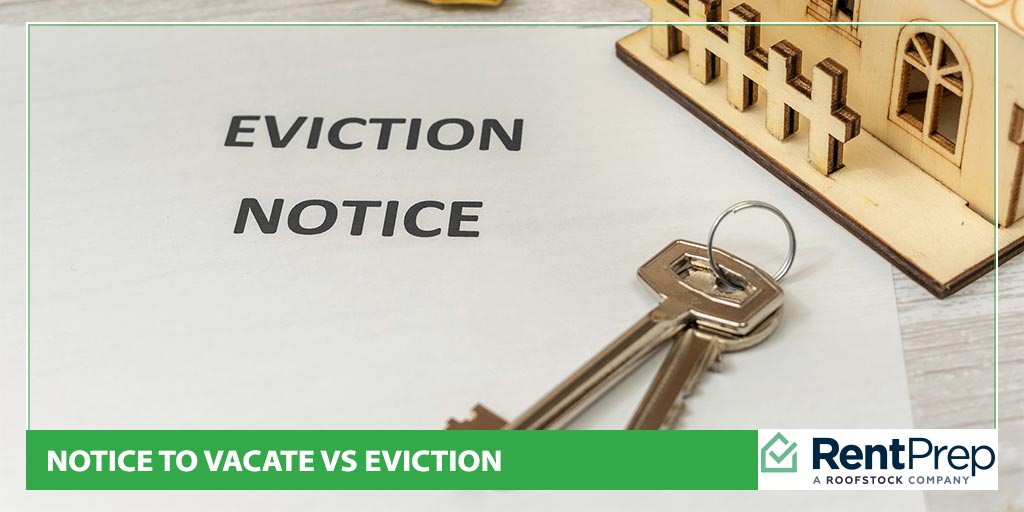
There are many reasons to remove a tenant from your rental property, from nonpayment of rent to property damage. When these situations arise, you need a legally sound way to address the issue and remove the tenant from the property.
Should you issue a notice to vacate or an eviction letter?
These are both legal documents, each used for specific circumstances and stages in the process of removing a tenant. Choosing the right document at the right time is crucial to ensure you’re on solid legal ground and to successfully reclaim control of your property.
Read on as we help you navigate the differences between a notice to vacate vs. an eviction letter and when to use each.
Table Of Contents: Notice To Vacate vs. Eviction
Removing a tenant from your rental property can include several steps. It will start with a notice to vacate and can end in eviction. Find the information you need in our comprehensive guide below.
- When To Use A Notice To Vacate?
- How To Write A Notice To Vacate Letter?
- When To Use An Eviction Notice?
- Notice To Vacate FAQs
- Regaining Control Of Your Property
When To Use A Notice To Vacate

A notice to vacate is the first stage of removing an unwanted tenant from your property. It’s how you officially let them know that you want them to leave.
There are laws about exactly when you can ask someone to vacate your property. Most states allow you to inform a tenant that you would like them to leave if the tenant:
- Is not paying their total rent on time
- Has caused significant damage to the property
- Is letting a guest stay in the home for an extended period
- Has unauthorized pets on the premises
- Is engaging in illegal activity on the premises
Some states allow you to ask a tenant to vacate for no specified reason in certain circumstances such as month-to-month leases, as long as your motivation is not to discriminate against the tenant. But other states, such as California, require that you have a specific reason for wanting the tenant to leave.
These laws exist to protect tenants from being evicted on unjust grounds. For instance, you cannot evict a tenant simply because you disapprove of their new partner who visits the property, nor can you evict them for recently having a child. Such actions would be deemed discriminatory.
A notice to vacate does not necessarily have to result in the tenant leaving. You can let your tenant rectify the situation if they want to continue living in the property. This could be paying rent owed by a specific date or paying for damage to be fixed by a certain date.
If you’re asking the tenant to vacate, there is a minimum period of time you must give them to leave. How long depends on your rental contract, why you’re asking them to leave, and local laws. If the tenant is in violation, for example rent is overdue, the vacate period can be as little as three days. If they are not in violation, it is then usually 30 days notice if the tenant has lived in the property for less than a year, and at least 60 days if they have lived in the property for more than a year.
However, it’s not just landlords who may initiate changes in tenancy. A tenant can also break a lease if they no longer wish to live in the property or believe you are not fulfilling your duties as landlord. The latter could be a failure to maintain the property in a habitable state or overstepping your rights as a landlord through actions such as showing up to inspect the property without giving proper notice.
Read more about what happens when a tenant breaks their lease early here.
How To Write A Notice To Vacate Letter
A notice to vacate is an official legal document that lets your tenant know how they have broken the lease terms and the consequences of those actions. To fully comply with the letter of the law, the notice to vacate should contain the following information.
First is basic identifying information. Who is the tenant, who is the landlord, and what is the address of the property in question? When was the original lease signed, and when will it expire? You should also list anyone else involved in the rental process, such as a property manager.
Next is information about the termination. This section should clearly state how the terms of the lease have been broken, including specifics about rent owed or incidents. If the tenant is breaking the lease through their actions, such as having unauthorized pets in the home, refer to the specific clause in the contract that prohibits this behavior.
Now, you should tell the tenant how you want to resolve the situation. This usually means a date by which they must vacate, which must be compliant with local laws on notice periods. You should also include information about the process of vacating the property, such as the date, time, and circumstances under which the final inspection will take place and what will happen with the tenant’s security deposit.
If you want to allow your tenant to rectify the situation and continue living in the home, also provide details about how this can be done. These instructions should include when the rent must be paid or how long they have to change or remedy the offending behavior.
Conclude the letter with information on how the tenant should contact you for more information as needed. Be sure to sign and date the letter.
Once the letter is written, local laws usually dictate how it should be delivered to the tenant. Some states require hand-delivery, while others require that the official notice be posted and how.
If you have options, your best approach is always to send the letter via certified mail. This gives you proof of delivery. If you slip the notice under the door, for example, it’s too easy for the tenant to claim they never received it.
Read our full guide to how to write a notice to vacate letter to a tenant here.
When To Use An Eviction Notice

An eviction notice is used later in the process of removing a tenant from your property. You move to eviction if your tenant does not comply with the conditions of the notice to vacate and stays in the property without your permission.
An eviction notice is different from a notice to vacate because it is a court order to leave the property that law enforcement will carry out.
To obtain an eviction notice, you must first file an eviction case with your local court and send a written notification to your tenant, letting them know you’re taking legal action against them.
When your case comes up in court, you’ll need to provide documentation explaining the situation with your tenant. This should include evidence of their wrongdoing that triggered the notice to vacate, such as not paying bills. You should also include the notice to vacate as evidence and evidence that the tenant has not complied.
While these cases can sometimes seem like a “slam dunk” for the landlord, eviction cases can be more nuanced than expected. This usually comes down to the Fair Housing Act, which protects tenants against discrimination. Suppose they can show what appears to be discrimination against them for any of the protected characteristics. In that case, you can find that you’re the one suffering the consequences, even if that was never your intention.
This is why it’s essential to prepare all of your documentation, both when dealing with your tenant and when filing with the court. Read more about how to prepare for an eviction court hearing here.
If you win the case, court or law enforcement representatives will then take responsibility for evicting the tenant. Don’t use it as an invitation to go to the property and remove them. While the tenant is still in the home, you must maintain your behavior as a landlord, including not showing up at the property without proper notice.
Read our landlord’s guide to evicting a tenant here.
If you don’t want to go through the hassle and expense of the court system, there are other things you can legally do to get your tenant to leave. Read our guide, How to Get Rid of a Tenant Without Eviction: Best 2 Methods.
Notice To Vacate vs. Eviction FAQs
Below are answers to some of the most frequently asked questions by landlords about notices to vacate and eviction cases.
What happens after a notice to vacate?
After sending a notice to vacate, you’ll have to play the waiting game. In most cases, you must give your tenant 30 days to leave the property or resolve the issue, and it can be an anxious time waiting for those 30 days to pass so you can move forward. If nothing is resolved by the deadline of the notice to vacate, you can then file with the court to have your tenant evicted.
In most states, eviction cases are usually heard between 10 and 14 days after the landlord filed suit, but it can vary significantly among districts. There can then be further delays depending on how long the court gives the tenant to vacate the property and how quickly authorities pursue the eviction.
Can a notice to vacate be withdrawn?
Yes, a notice to vacate can be withdrawn, which is not uncommon. Many notices will include information for the tenant on how to correct a problem and continue living in the property. As a matter of good practice, you should send a letter to your tenant confirming that you’re happy with the steps they have taken to correct the problem and reinstate the original lease.
Will a notice to vacate go into my record?
No, a notice to vacate does not automatically appear on a tenant’s record. However, if the tenant fails to pay rent, that missed payment can negatively impact their credit score. For example, if the tenant reports their rent payments to credit bureaus, missed payments could damage their score. An eviction case will go on their record as it is a legal public record case.
Even if the tenant wins the case, it can be damaging. Landlords can see that information when screening a prospective tenant. Even if they were not found at fault, a new landlord might still be wary of taking that tenant on when they have other applicants. It could be argued that this is discrimination, but it’s hard to make the case when rental house hunting.
Regaining Control Of Your Property
It can be a long, frustrating process to regain control of your property from tenants who aren’t paying their rent or are damaging your property. You do have to give your tenant several opportunities to do the right thing, whether paying their rent or adjusting their behavior, before you can take legal action against them.
While it can be time-consuming, it’s essential to follow all the steps to ensure you have the legal high ground when it comes to eviction. If you don’t give your tenant sufficient notice or start acting in a way they could construe as intimidating, you could be the one who finds yourself in legal trouble.
Regaining control of your property starts with the notice to vacate, which tells the tenant you want them to fix the problem or leave and by when this must be done.
The best way to avoid finding yourself in a situation where you have an unsuitable tenant is proper tenant screening. This reveals so much more than if a tenant can afford to pay. It can also show if they have previously had an eviction case filed against them, if they move frequently, and in some cases, whether they consistently pay their rent on time.

